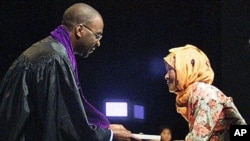Kenya may finally be nearing completion of its long-awaited judicial reform program following nominations for several key positions in the country's judicial branch. This would be a major move forward after months of infighting and setbacks. Despite the milestone, not all are happy with those chosen to lead the courts.
On Monday, members of Kenya’s civil society gathered in Nairobi to express their support for lawyers Willy Mutunga and Nancy Barasa, who were nominated last week by Kenya’s Judicial Service Commission for the positions of chief justice and deputy chief justice respectively.
If approved by parliament, the two will become the leading figures in the fight against the notorious corruption and inefficiency in Kenya’s courts. The chairman of the National Civil Society Congress, Maurice Odhiambo, said Monday that both Mutunga and Barasa are well-prepared to meet the challenge.
“We believe that the two, Dr. Willy Mutunga and Ms. Nancy Barasa, fit this bill perfectly, having worked with well-known reform institutions both in civil society, but also in the government,” said Odhiambo.
Mutunga was further praised by members of the civil society congress as one of the leading advocates of human rights and judicial reform. He previously served as the chairman of the Law Society of Kenya, where he spearheaded the Citizen’s Coalition for Constitutional Change to push for legal reforms.
The civil society groups are, in part, responding to criticisms raised by politicians over the nominees and the process in general. Many lawmakers have already promised to reject the nominations when the matter is presented to parliament.
Presidential hopeful and International Criminal Court suspect William Ruto blasted the nomination of Mutunga, telling his constituents Mutunga’s beliefs and convictions were unknown, making him a dangerous choice. Ruto also took issue with the fact that Mutunga wore an earring in his left ear, arguing a man wearing an earring was not fit for the position.
Some lawmakers and lawyers also are criticizing the Judicial Service Commission for failing to submit multiple candidates for chief justice and deputy chief justice, effectively usurping the president’s decision-making authority.
The Law Society of Kenya Chairman Apollo Mboya told VOA that despite the controversy, the JSC acted within its mandate.
“There is no constitutional provision that they have violated. I think it was informed by the need to safeguard that important position from political machinations," said Mboya. "By presenting more than one name it would have opened that important position to political horse-trading and I think that is what they were trying to safeguard.”
Mboya told VOA the Law Society was very happy with the names put forward by the commission.
On Saturday, the commission also put forth a shortlist of three names for the position of director of public prosecutions. President Mwai Kibaki and Prime Minister Raila Odinga are expected to meet during the week to consider the nominations.
Kenya’s Judicial Reform Moves Forward With Key Nominations




